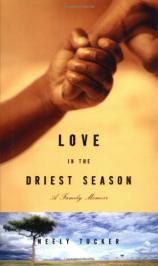Love in the Driest Season: A Family Memoir
Review
Love in the Driest Season: A Family Memoir
Despite being a wonderful book, LOVE IN THE DRIEST SEASON was
difficult to read. Or maybe I should say, "Because it is a
wonderful book."
This is a wrenching, ultimately wonderful tale of an American
couple who adopts a child. Most, if not all, adoption stories are
unique and traumatic at times. This one surpasses a lot of
assumptions. For one thing, Neely and Vita Tucker are anything but
an average married couple. Both raised in rural Mississippi, they
carry with them memories and experiences of American racism. Neely
is white; his wife Vita, eleven years his senior, is black. Neely
is an experienced war correspondent who has worked for years at the
Detroit Free Press, covering the horrors of war, torture and
ugliness all over the world. When he and Vita (who has a degree in
liberation theology and a background as a paralegal and researcher)
move to Zimbabwe so that Neely can serve as the Free Press's
African correspondent, they search for something to do in their
community.
Ultimately, they end up at an orphanage that is overwhelmed with
abandoned children. Many, indeed most of the children at
Chinyaradzo Children's Home, have been orphaned by parents who died
of AIDS. In past times, children were not abandoned, but taken in
by extended families; now, there are few families that can take up
the burden. A baby girl named Chipo, or "gift," catches Neely and
Vita's eyes and they decide to try to adopt her. They cannot have
children of their own, which is seen as a tragedy by the people
they meet in Zimbabwe.
Realizing the irony of trying to save one child in the face of the
devastation of AIDS, an uncaring and massively overburdened
government and the amazing disdain (even paranoia) of President
Robert Mugabe, Neely, during this story, is still traveling all
over Africa as a reporter. Unlike some reporters who are almost too
good at being objective, Neely relates every spin, every defeat,
every feeling that these people went through in order to save
Chipo's life. They took Chipo in not knowing if she had AIDS, and
fought month after month to keep her healthy. But they're not
saints, and they don't pretend to be. This is the strength, and
pain, of the book. These are somewhat ordinary people --- but with
extraordinary patience, resolve and heart.
Neely's job takes him away and often Vita spends weeks alone with a
child who wakes up crying hour and hour. At one point, when Neely
comes home, he describes his wife as having that thousand-yard
stare because she is so sleep-deprived. But neither of them ever
thinks of quitting.
The determination of Neely and Vita astounded me. I cannot imagine
doing what they did. Some Zimbabwe officials were extremely
skeptical of Americans (especially white Americans) wanting to
adopt a black baby from Zimbabwe --- it's not done, and sometimes
it's seen as some form of kinky sexual gratification. Some assumed
that the Tuckers must have bribed someone, which is ludicrous
considering all of the work they put in, but apparently not
uncommon with the horrid bureaucracy that people seem to deal with
in the Mugabe government.
It was so hard to read of the losses, the deaths and the failures
at the orphanage --- Vita and Neely more than once decide that they
must take in a second child, only to witness that child's death.
They already have challenges in their own lives. Neely's parents
would not attend their wedding; coming from a racist culture, his
parents could not and would not accept that their son would marry a
black woman, not to mention an older black woman. And yet
one of the finest moments in this story is when Neely's father
states (in front of his 50th high school reunion class) that he is
proud to have a granddaughter from Zimbabwe named Chipo.
The Tuckers lived in the midst of chaos in Zimbabwe; as Robert
Mugabe's regime collapsed, they got out just before the worst
chaos. But over and over, they encountered apathy, suspicion, hate
and bias; as a journalist Neely was often targeted as someone who
reported lies. He was in Nairobi within hours of the embassy
bombing, and his descriptions are pure hell to read. He and Vita
both dealt with anger and despair, the most amazing stress and
depression.
Fortunately, their story ends well. I have nothing but admiration
for Neely and Vita, who went all out to save one life. And they are
aware of the irony --- that that was all they could do in the face
of poverty, indifference and the most astonishing bureaucratic
meltdown I've ever seen (it makes some of the bureaucracies I've
dealt with seem like models of efficiency). This is a story that
must be read and understood, so that these people's lives can be
seen and admired.
Reviewed by Andi Shechter (roscoe@drizzle.com) on January 22, 2011
Love in the Driest Season: A Family Memoir
- Publication Date: February 17, 2004
- Genres: Nonfiction
- Hardcover: 256 pages
- Publisher: Crown
- ISBN-10: 0609609769
- ISBN-13: 9780609609767




